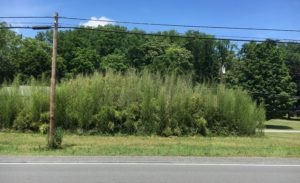Hello fellow readers, Katie of Piscataway, NJ, recently shared her ‘horrible backyard dilemma.’ Her home was once her Dad’s, which piqued my curiosity. How could her Dad’s backyard be so horrible? It turns out the neighbor’s bamboo has taken over.
At first glance, bamboo seems appealing. It’s tropical looking, creating a feeling of being on vacation, and spreads quickly, offering a fast screen but spreading quickly is an understatement. This stuff spreads like wildfire unless you contain it from the get-go.
Bamboo is in the grass family (Poaceae) and is native to all but Europe and Antarctica. Only three species are native to the southeast, though over 200 of the 1400 species worldwide are in the United States.
Rhizomes, which are underground stems, connect the stalks of bamboo (called culms). There are clumping and running forms of bamboo. As you would guess, the clumping kind is less aggressive with their rhizomes, only spreading one to several inches a year. The running forms, which are more cold-hardy and hence most common in these parts, are also spread by rhizomes but by several feet a growing season.
The American Bamboo Society (ABS) claims bamboo is not invasive if planted and managed correctly. They recommend planting running bamboo with an 80 mil thick polyethylene barrier as concrete can crack, and metal barriers have seams that are easy for bamboo to penetrate. Barriers should be 24 to 30 inches deep, deeper in loose or sandy soil, and 2 inches above grade to inhibit rhizomes from jumping over.
Even with barriers, annual rhizome pruning is vital to prevent its spread. The period when new shoots form is only a few weeks each spring. Cut shoots you don’t want with a spade or saw. Or, if new shoots are on the lawn, mow over them.
Once established, removing bamboo takes digging out, likely a backhoe – the equipment of choice. Cutting bamboo to the ground over and over to deplete the energy stored in the rhizomes can work, but it will take years. The ABS does not recommend using chemicals to kill bamboo due to environmental damage. Some say bamboo does not respond well to any herbicide currently available.
Bottom line – Like many things in life, it will grow out of control if you neglect bamboo. ‘But properly managed,’ the ABS writes, ‘a clump or grove is a beautiful sight to behold.’ Garden Dilemmas? AskMaryStone@gmail.com and your favorite Podcast App.
Column Updated 8/7/22



